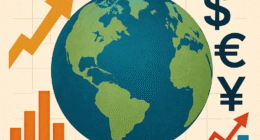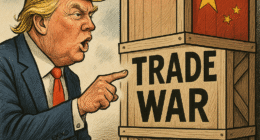Artificial intelligence is set to affect nearly 40% of all jobs, according to a new analysis by the International Monetary Fund (IMF).
IMF’s managing director Kristalina Georgieva says “in most scenarios, AI will likely worsen overall inequality”.
Ms Georgieva adds that policymakers should address the “troubling trend” to “prevent the technology from further stoking social tensions”.
The proliferation of AI has put its benefits and risks under the spotlight.
The IMF said AI is likely to affect a greater proportion of jobs – put at around 60% – in advanced economies. In half of these instances, workers can expect to benefit from the integration of AI, which will enhance their productivity.
In other instances, AI will have the ability to perform key tasks that are currently executed by humans. This could lower demand for labour, affecting wages and even eradicating jobs.
Meanwhile, the IMF projects that the technology will affect just 26% of jobs in low-income countries.
It echoes a report from Goldman Sachs in 2023, which estimated AI could replace the equivalent of 300 million full-time jobs – but said there may also be new jobs alongside a boom in productivity.
Ms Georgieva said “many of these countries don’t have the infrastructure or skilled workforces to harness the benefits of AI, raising the risk that over time the technology could worsen inequality among nations”.
More generally, higher-income and younger workers may see a disproportionate increase in their wages after adopting AI.
Lower-income and older workers could fall behind, the IMF believes.
“It is crucial for countries to establish comprehensive social safety nets and offer retraining programmes for vulnerable workers,” Ms Georgieva said. “In doing so, we can make the AI transition more inclusive, protecting livelihoods and curbing inequality.”
The IMF analysis comes as global business and political leaders gather at the World Economic Forum in Davos, Switzerland.
AI is a topic of discussion, following the surge in popularity of applications like ChatGPT.
The technology is facing increased regulation around the world. Last month, European Union officials reached a provisional deal on the world’s first comprehensive laws to regulate the use of AI.
China has introduced some of the world’s first national regulations on AI, which include rules concerning how algorithms can be developed and deployed.
In October, President Biden signed an executive order compelling developers to share safety results relating to AI with the US government.
The following month the UK hosted an AI Safety Summit, at which at a declaration on the safe development of the technology was signed by multiple countries.














61 comments
Your style is so unique compared to many other people. Thank you for publishing when you have the opportunity,Guess I will just make this bookmarked.2
Hello there, I found your site via Google while searching for a related topic, your website came up, it looks great. I’ve bookmarked it in my google bookmarks.
Somebody essentially help to make seriously articles I would state. This is the first time I frequented your web page and thus far? I surprised with the research you made to make this particular publish amazing. Great job!
Interesting blog! Is your theme custom made or did you download it from somewhere? A theme like yours with a few simple tweeks would really make my blog shine. Please let me know where you got your theme. With thanks
Hello there! Do you know if they make any plugins to help with Search Engine Optimization? I’m trying to get my blog to rank for some targeted keywords but I’m not seeing very good results. If you know of any please share. Many thanks!
Thank you for another wonderful post. Where else could anybody get that type of info in such a perfect way of writing? I have a presentation next week, and I am on the look for such information.
Really great info can be found on site.
There are certainly numerous particulars like that to take into consideration. That could be a nice point to carry up. I provide the thoughts above as basic inspiration however clearly there are questions just like the one you convey up the place the most important factor might be working in trustworthy good faith. I don?t know if greatest practices have emerged around issues like that, however I’m sure that your job is clearly identified as a good game. Both boys and girls feel the impression of just a moment’s pleasure, for the rest of their lives.
It¦s really a nice and useful piece of info. I am satisfied that you just shared this useful information with us. Please keep us up to date like this. Thanks for sharing.
Thanks for this marvelous post, I am glad I discovered this site on yahoo.
This is a topic close to my heart cheers, where are your contact details though?
I rattling lucky to find this site on bing, just what I was looking for : D also saved to fav.
I’ve been absent for some time, but now I remember why I used to love this blog. Thanks , I¦ll try and check back more often. How frequently you update your website?
You have mentioned very interesting points! ps nice internet site.
I was suggested this web site by my cousin. I am not sure whether this post is written by him as no one else know such detailed about my problem. You are incredible! Thanks!
Adorei este site. Para saber mais detalhes acesse o site e descubra mais. Todas as informações contidas são informações relevantes e únicos. Tudo que você precisa saber está ta lá.
There are some interesting closing dates in this article however I don’t know if I see all of them middle to heart. There is some validity but I’ll take maintain opinion until I look into it further. Good article , thanks and we want more! Added to FeedBurner as properly
I wanted to thank you for this great read!! I definitely enjoying every little bit of it I have you bookmarked to check out new stuff you post…
buying cheap clomiphene without dr prescription where to buy clomid tablets can i buy clomid no prescription where to get generic clomid no prescription where can i buy cheap clomiphene price generic clomid c10m1d where to get cheap clomid no prescription
I went over this web site and I believe you have a lot of good info, bookmarked (:.
I believe you have observed some very interesting details, thanks for the post.
Howdy, i read your blog occasionally and i own a similar one and i was just curious if you get a lot of spam remarks? If so how do you prevent it, any plugin or anything you can advise? I get so much lately it’s driving me crazy so any help is very much appreciated.
More posts like this would make the blogosphere more useful.
zithromax canada – tetracycline brand buy metronidazole generic
purchase rybelsus without prescription – buy periactin online cheap order cyproheptadine 4mg generic
Youre so cool! I dont suppose Ive learn anything like this before. So good to seek out someone with some unique thoughts on this subject. realy thanks for beginning this up. this website is something that’s needed on the internet, somebody with a little bit originality. helpful job for bringing something new to the internet!
oral motilium – order generic motilium 10mg flexeril ca
generic propranolol – plavix cost methotrexate 2.5mg without prescription
cheap amoxil pills – buy amoxicillin cheap ipratropium 100mcg uk
buy zithromax 500mg generic – order generic tindamax 300mg buy nebivolol 5mg sale
order amoxiclav online cheap – https://atbioinfo.com/ cost acillin
nexium 40mg capsules – https://anexamate.com/ nexium pills
buy warfarin 2mg for sale – anticoagulant order cozaar pills
I like what you guys are up also. Such clever work and reporting! Carry on the excellent works guys I¦ve incorporated you guys to my blogroll. I think it’ll improve the value of my website 🙂
meloxicam 7.5mg generic – relieve pain meloxicam pill
buy cheap prednisone – https://apreplson.com/ brand prednisone 20mg
buy generic ed pills over the counter – pills erectile dysfunction gnc ed pills
purchase diflucan – fluconazole 100mg price forcan pills
lexapro 20mg pill – lexapro 10mg us generic escitalopram 20mg
cenforce without prescription – https://cenforcers.com/# cenforce oral
cialis purchase – https://strongtadafl.com/ buy cialis on line
order ranitidine sale – ranitidine 300mg pill zantac drug
cheap generic viagra india – cheap viagra canada pharmacy 50mg viagra prices
More posts like this would prosper the blogosphere more useful. https://gnolvade.com/
I couldn’t weather commenting. Warmly written! https://buyfastonl.com/
I’ll certainly carry back to be familiar with more. https://prohnrg.com/product/acyclovir-pills/
This is the tolerant of enter I find helpful. https://aranitidine.com/fr/acheter-propecia-en-ligne/
Great amazing things here. I?¦m very satisfied to look your post. Thanks so much and i’m taking a look forward to touch you. Will you please drop me a e-mail?
Would you be considering exchanging hyperlinks?
Thank you, I have just been searching for info about this topic for ages and yours is the best I have discovered till now. But, what about the conclusion? Are you sure about the source?
When I initially commented I clicked the “Notify me when new comments are added” checkbox and now each time a comment is added I get four emails with the same comment. Is there any way you can remove people from that service? Appreciate it!
What’s Happening i am new to this, I stumbled upon this I’ve found It absolutely useful and it has helped me out loads. I hope to contribute & help other users like its helped me. Good job.
This is the kind of glad I take advantage of reading. https://ondactone.com/simvastatin/
This website really has all of the tidings and facts I needed about this participant and didn’t know who to ask.
oral dutasteride
I have read some good stuff here. Definitely price bookmarking for revisiting. I wonder how much effort you place to create one of these wonderful informative website.
F*ckin¦ tremendous things here. I am very glad to look your article. Thanks so much and i’m taking a look forward to contact you. Will you please drop me a e-mail?
Good blog you possess here.. It’s severely to on great worth belles-lettres like yours these days. I honestly recognize individuals like you! Take care!! http://zgyhsj.com/space-uid-977929.html
The other day, while I was at work, my cousin stole my iphone and tested to see if it can survive a 40 foot drop, just so she can be a youtube sensation. My iPad is now destroyed and she has 83 views. I know this is completely off topic but I had to share it with someone!
I’d have to examine with you here. Which is not one thing I usually do! I take pleasure in reading a post that may make folks think. Additionally, thanks for permitting me to comment!
dapagliflozin brand – generic forxiga 10mg order forxiga 10 mg generic
Good day very cool site!! Guy .. Excellent .. Amazing .. I will bookmark your web site and take the feeds additionallyKI am glad to find so many helpful information right here within the put up, we want develop extra techniques on this regard, thank you for sharing. . . . . .